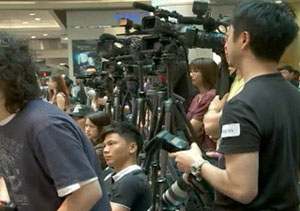
HONG KONG (Hong Kong Journalists Association/Pacific Media Watch): The period from July 2010 to June 2011 has not been conducive to freedom of expression in Hong Kong. This is the main finding of the Hong Kong Journalists Association's annual report for 2011, entitled "Two Systems Compromised: Free Expression Under Threat in Hong Kong".
The report notes that, in regards to the governance of Hong Kong, the one-country element is increasingly prevailing over the two systems approach. This manifests itself most notably in Beijing taking a more aggressive role in its policy towards the Special Administrative Region.
At the same time, the Hong Kong government is becoming more sensitive to Beijing's wishes, insofar as the police have become less tolerant of protesters - in particular those staging rallies outside Beijing's Liaison Office; mainland dissidents have been barred from Hong Kong; and the government has refused to countenance meaningful reform of Radio Television Hong Kong (RTHK).
One of the few good pieces of news to come out in the year under review was the announcement that the government would not enact national security legislation under Basic Law Article 23 during the remainder of the term of the chief executive, Donald Tsang, which ends in June 2012. However, that does not mean that the legislation - which would pose a very serious threat to freedom of expression - would not be enacted by the following chief executive, who will be chosen in March 2012.
In many ways, the HKJA has given up on expecting real change in the way that the current administration, under Donald Tsang, handles press freedom matters - even though the government claims that it protects this fundamental right. We now look to the next chief executive for a more positive approach. In this respect, we call on whoever is elected to take a more positive approach towards freedom of expression issues.
In particular, we call on the new chief executive to resist pressure to enact national security legislation. The HKJA believes that such legislation is unnecessary as there is no pressing need for its enactment and existing laws are already sufficient in prohibiting acts contained in Article 23 of the Basic Law. However, if the government does decide to proceed with such legislation, then the law must contain safeguards that are robust enough to protect freedom of expression and press freedom.
The new chief executive should also enact, as a matter of urgency, freedom of information legislation to ensure access to government information and documents. He or she should also review government policies on the release of information to the media. The government should adopt the principle of maximum disclosure of such information, and should make it a rule to release information on new government policies at full press conferences.
He or she should also review the government's policy and attitude towards dissent, including policing, arrests and harassment of protesters, as well as the admission of dissidents to Hong Kong. And the new chief executive should reverse the government's decision to retain Radio Television Hong Kong as a government department, in favour of separating the broadcaster from the government so it can become truly independent.
* For more information:
Hong Kong Journalists Association
Flat A, 15/F Henfa Commercial Building
348-350 Lockhart Road, Wanchai
Hong Kong
hkja (@) hkja.org.hk
Phone: +852 2591 0692
Fax: +852 2572 7329
http://www.hkja.org.hk



